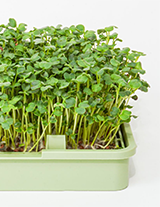Your cart
There are no more items in your cart

Hydroponics is a method of growing plants in which the roots are grown in a soilless medium such as water, sand or special substrates (hemp) and nutrients, often optional, are provided in solution. This growing method is increasingly used worldwide, especially in urban areas or where soil quality is poor or limited.
Hydroponics have many advantages over traditional farming, including:
- More efficient water use: require up to 90% less water than traditional crops. In a hydroponic system, water is prevented from evaporating.
- Increased yield: hydroponic crops grow much faster than traditional crops because the plants get all the nutrients they need directly from the nutrient solution without having to struggle to absorb them from the soil. Hydroponic crops also allow plants to be grown in smaller spaces, which can increase production efficiency.
- Reduced environmental impact: can reduce environmental impact through reduced use of pesticides and other chemicals. They can also be grown in urban areas, reducing the need to transport agricultural produce from remote rural areas.
- Year-round cultivation: hydroponics allows you to grow plants all year round, regardless of weather conditions.
- Superior product quality: hydroponics gives complete control over the growing environment so that plants can be grown under optimal conditions, ensuring superior product quality.
- Space saving: Hydroponics allows plants to be grown in smaller spaces without the need to use large areas of land.
In conclusion, hydroponics can be a useful tool in efforts to increase global food production.

 Microgreens
Microgreens